'A lot of the team started to get ill'
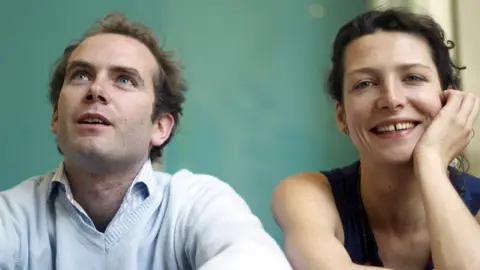 Wahaca
WahacaThe BBC's weekly The Boss series profiles different business leaders from around the world. This week we speak to Thomasina Miers and Mark Selby, founders of Mexican restaurant chain Wahaca.
When staff at a number of Wahaca branches started falling ill, Mark Selby says "it was a fairly big shock".
This was back in November 2016, when the UK business was hit by an outbreak of norovirus, otherwise known as the vomiting bug.
"A lot of the team started to get ill, and we didn't understand why," say Mark: "Then suddenly we started hearing from our customers a few days later."
In the end 200 members of staff and 160 diners were affected by the virus, and Wahaca had to temporarily close nine of its 25 sites.
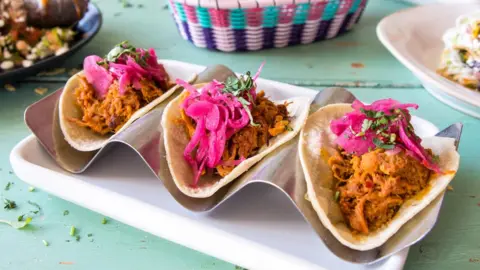 Wahaca
WahacaNot wanting employees to be out of pocket, the company continued to pay wages to everyone who was unable to work, even giving them an extra amount to compensate for the tips they were missing out on.
"It wasn't fair not to pay them," says Mark.
Meanwhile, Thomasina sent personal apology notes to customers, embedded with wildflower seeds: "I thought even if they throw it away, they might still get wildflowers growing in their garden."
Mark even visited a couple in Edinburgh who were affected by the virus on their wedding day. "I had a chat with them for half an hour. I wanted to say 'I'm so sorry'."
The co-founders never did find out where the norovirus originated from, but believe it might have come from a supplier.
"By the time we knew what it was, it had gone through [people's] systems," says Mark: "It came and went in a day, but the lasting effect was much greater."
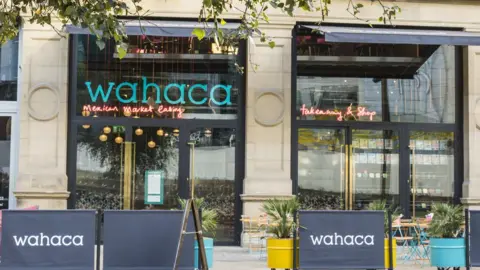 Paul Adams
Paul AdamsFinancially the outbreak had a substantial impact on the business, with Wahaca saying it was responsible for a £4.7m loss that financial year, compared with profits of £600,000 for the preceding 12 months.
Thankfully, the company was able to recover. Within a few weeks all of the affected restaurants were able to reopen and the business returned to profitability.
Today the popular chain has annual revenues of £47.9m.
Mark and Thomasina opened their first Wahaca restaurant in London's Covent Garden in 2007. They had been introduced by a mutual friend who knew they both had a passion for Mexican food.
Thomasina had not long returned to the UK after spending a year in Mexico. She had gone to the country after winning BBC TV cookery competition Masterchef in 2005.
Working in a friend's cocktail bar in Mexico City, she also travelled around the country to study all the regional food specialities.
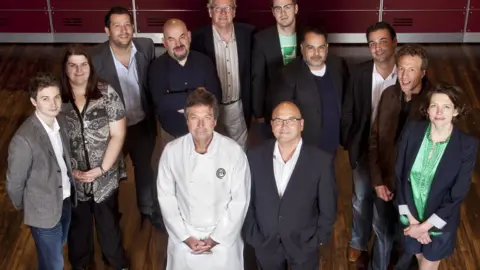
"I'd gone to Mexico when I was 18, and I was obsessed about the food," she enthuses.
"I didn't have a game plan [on her second visit], but had gone out there on a fact-finding mission. I was driven out of curiosity as to why Mexican food just hadn't got to the UK yet.
"I wanted to learn more about the food from each region. I thought, 'this is nuts, that's the biggest gastronomical secret in the world... why wasn't it here in the UK?'."
While Thomasina had a culinary background, Mark had been working at an investment firm called Capricorn Capital, which had a stake in chicken restaurant chain Nando's.
With Capricorn prepared to invest an initial £5m in Wahaca, the business partners had an easier start to their careers as restaurateurs than most. But there were still obstacles to overcome.
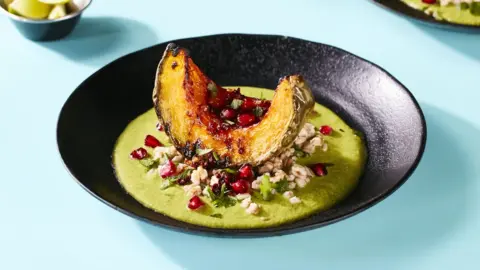 Steven Joyce
Steven Joyce"The first day we opened [in Covent Garden], we had to close after half an hour because there was flooding from backed-up drains," recalls Mark.
They'd also faced a staff shortage after placing a jobs advert online just 10 days before they opened.
"People said it would be easy [to find workers] but we had about four people apply, including a Texan who refused to take off his cowboy boots," says Thomasina.
"I said 'you can't cook in those shoes' and he was like 'I'm not taking them off'. We were like, 'this is harder than we thought'."
But despite the initial challenges the company soon expanded, and now has 1,100 employees across 25 locations in the UK.

More The Boss features:

Capricorn is the majority shareholder, owning 65% of the business. Thomasina and Mark share the remaining 35% with brothers Adam and Sam Kaye, who set up the Ask and Zizzi restaurant chains.
While Wahaca remains buoyant, other UK restaurant chains such as Prezzo, Byron, Jamie's Italian, Gourmet Burger Kitchen, and Giraffe, have had to close branches over the past year.
"Everyone is being hit," says Mark: "Rent, rates, wages and food costs have gone up - no-one could have forecast this. It's a perfect storm."
As an example, he says that at Wahaca's central London Soho branch, its annual rent has gone up from £300,000 to £800,000.
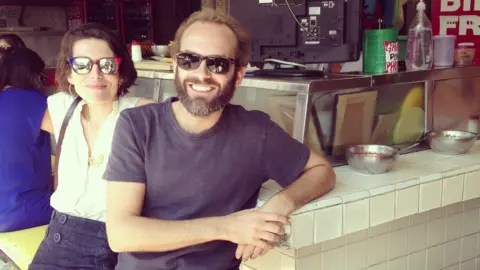 Wahaca
WahacaTrish Caddy, senior food industry analyst at research group Mintel, says Wahaca will need to continue to focus on offering both good quality and good value for money, to tempt consumers who are cutting back on going out for meals.
"Although the ethnic restaurants market will continue to grow, much of that growth will come from businesses driving existing store performances on the back of strong brand management, menu development, and home delivery options.
"In other words, sit-down restaurant chains have become destination businesses, through offering healthier options, and a higher quality of food and drink and services."
Against such a backdrop, there are no ambitious plans to open a Wahaca in every town and city.
"We're always looking, but we're not up for taking big risks," says Mark: "But we're constantly looking at our food and how to get it better."
Thomasina, who also writes cookery books, adds: "What we want in the next 10 years is for people to say should we go for tacos, pizza or a burger in the same sentence.
"When that's happening, I feel like we've achieved what we wanted to do."
